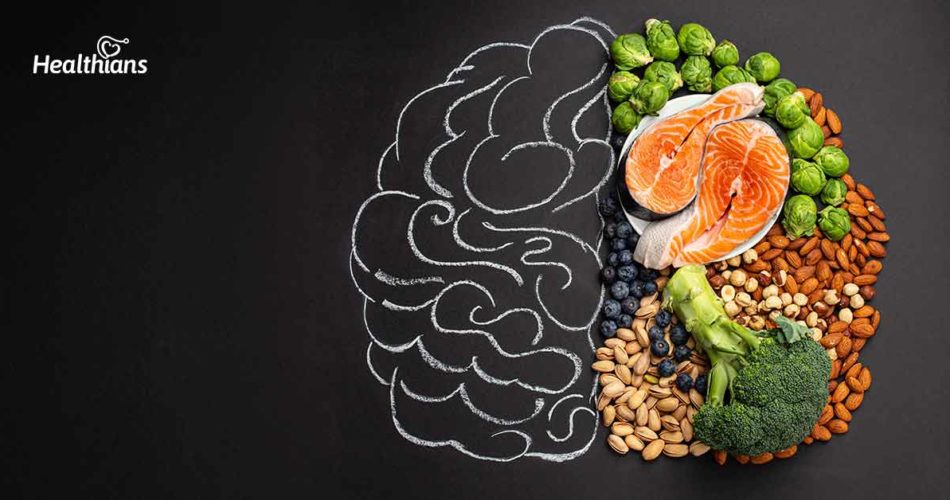Contributed by: Healthians Team
Introduction
You’ve probably heard the term “brain food,” but do you know what exactly does it means or if, indeed, there really is such a thing as ‘brain food’?
Is it true that we may use food to improve our mental clarity and focus?
Are there some foods that can support your brain health and boost your alertness, memory, and mood?
How does food affect your brain?
A large, new study shows how our dietary habits can play a key role in keeping our brain healthy.
Certain foods can impact and affect the brain both positively and negatively.
There are a number of ingredients that are brain-boosting superstars that can keep your brain in peak working condition, such as:
- Flaxseeds
- Walnuts
- Dark Chocolate
- Eggs
On the other hand, there are plenty of foods that could be potentially problematic for brain health and should make fewer appearances in your diet. The most significant of these are:
- Cakes and cookies
- Fast or junk food
Read on to discover more about what impacts these foods have on cognitive functions.
Good food #1: Flaxseeds
This plant-based source is rich in polyunsaturated fats — Omega-6 and Omega 3 fatty acids — that are essential for brain development and function.
Flax is predominantly high in alpha-linolenic (ALA), a type of Omega-3 fatty acid that boosts the cerebral cortex, an area of the brain that processes sensory information.
Adding flaxseeds to a salad or hot or cold cereal provides healthy, concentration-boosting fats to your diet.
Good food #2: Walnuts
Walnuts resemble the human brain and are famed as ‘brain food‘ as they are high in a type of Omega-3 fatty acid called alpha-linolenic acid (ALA).
Walnuts also possess the highest concentration of polyphenolic compounds than any other type of nut.
Both Omega-3 fatty acids and polyphenols are considered essential nutrients which help improve cognitive development and functioning.
Several studies have proven that munching these nutrient-dense nuts regularly can counteract oxidative stress and inflammation, two main drivers of cognitive decline.
Good food #3: Dark chocolate
Several observational studies have established that savouring a piece of this tasty stuff regularly can significantly improve cognitive function.
The high concentration of antioxidants (particularly flavonoids) in dark chocolate has been linked to improved blood flow to the brain, which was found to benefit memory, processing speed, attention, and overall mental performance.
Incorporating some dark chocolate into your diet may also have an anti-inflammatory effect.
Additionally, dark chocolate — with its instant jolt of caffeine — provides the instant rush of attention-boosting endorphins and improves both mental and physical performance.
Good food #4: Eggs
Egg yolks are rich in choline and lutein, two nutrients that play an important role in regulating memory and cognitive function.
Choline, a little-known nutrient is “something of a brain food” that plays a critical role in brain development and health during foetal development and throughout the lifespan.
It has also been shown to protect against cognitive decline as we age, making eating foods with choline, like eggs, particularly important as we age.
Bad food #1: Cakes & cookies
Consumption of high-sugar foods, including ready-made cakes and pre-packaged cookies, can have a negative effect on the brain as these induce an increased risk of Alzheimer’s disease, poorer memory, lower brain volume and cognitive decline.
The fats, known as trans fats, used in processed food to improve the texture, shelf life or flavour have been strongly linked to worsening of memory and the imbalance of neurotransmitters like dopamine and serotonin.
Bad food #2: Soda & sugary drinks
Research shows that people who frequently consume sugary beverages such as sodas, sweet tea, etc. are more likely to develop memory problems and lead to accelerated brain ageing.
The likely reason: These drinks include a form of sugar called fructose, which may damage the blood vessels that supply the brain with blood and hurt the brain itself.
Final thoughts
What you eat definitely has a huge impact on your brain health. Therefore, repairing your relationship with food should always be a priority, especially when it comes to supporting cognition!
That said, it is important to remember that no single food has the power to enhance or destroy your brain’s health and performance.
Certain harmful foods can impair attention and lead to an increased likelihood of short-term memory problems, as well as a higher chance of cognitive decline.
Therefore, it’s important to identify these foods and work on reducing their intake from your diet to mitigate their effects.
One of the best things you can do for your brain is to take a look at your diet — are you strategically including brain-boosting foods in your diet?
Besides adding these super brain foods to your diet, you must also opt for preventive diagnostic tests to identify any potential complications and take measures to protect your overall well-being.




